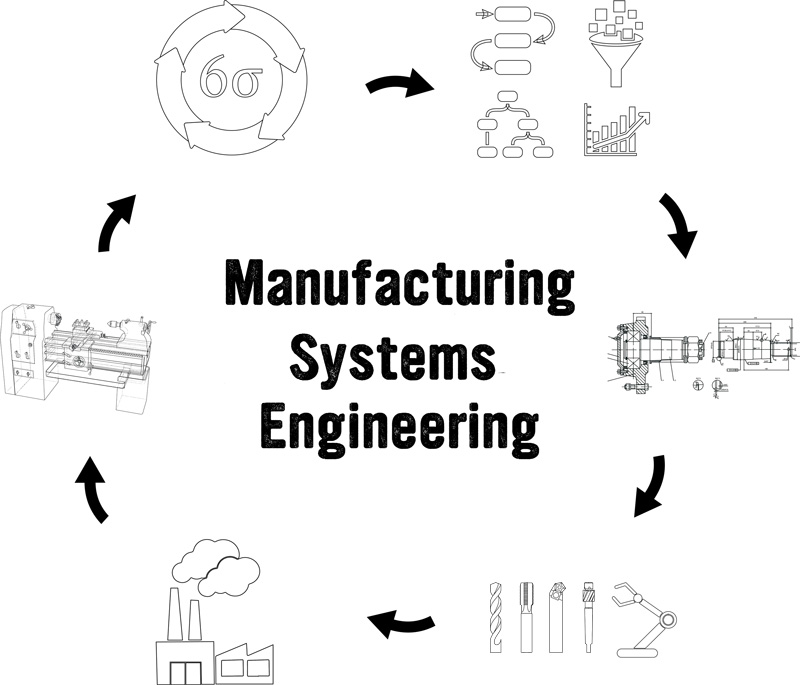
Manufacturing Systems Engineering

- What is Manufacturing Systems Engineering?
- What is the difference between Manufacturing Engineering Systems and Manufacturing Engineering Technology?
- Why pursue a bachelors in Manufacturing Systems Engineering?
- What is systems thinking?
- Why choose Weber State for your degree in Manufacturing Systems
Engineering Degree? - What will I learn in my bachelors in Manufacturing Systems Engineering?
- Why study Manufacturing Systems Engineering over other engineering disciplines?
Salaries in Utah
Annual Median Salary: $76,300*
*utahfuture.org
Annual median salaries noted are Utah-wide. Salaries vary depending on the region, workplace and skill level.

What you will learn
- Design and improve manufacturing processes and systems
- Proper selection of materials and manufacturing processes
- Conduct productivity, quality, timeliness, and cost studies
- Design new facilities or improve existing facilities
- Solve problems and leverage data-based decision making
- Apply economic principles to engineering decisions
- Manage manufacturing processes and systems
- Manage systems from systems design, implementation, and retire systems
ABET Accreditation
The Manufacturing Systems Engineering program is accredited by the Engineering Accreditation Commission(s) of , under the General Criteria and the Program Criteria for Manufacturing Systems Engineering and Similarly Named Engineering Programs.
Program Educational Objectives
Graduates from the Manufacturing Systems Engineering program will:
- Technical Competence: Graduates will have a strong foundation in manufacturing engineering principles and systems thinking, which they will use to design and optimize manufacturing processes and systems.
- Professional Growth: Graduates will continue to develop their technical and leadership skills, pursuing advanced degrees, professional certifications, or industry specific training as appropriate.
- Effective Communication: Graduates will be able to communicate technical information effectively to varying audiences, including engineers, managers, and customers.
- Ethical Behavior: Graduates will demonstrate ethical behavior and responsibility in their professional practice, and contribute positively to society and the environment.
- Teamwork and Collaboration: Graduates will work effectively in interdisciplinary teams, applying their technical knowledge to solve complex problems.
- Continuous Improvement: Graduates will engage in continuous learning and improvement, applying innovative approaches to manufacturing processes and systems to enhance competitiveness.
- Proactive Problem Solving: Graduates will apply their knowledge of manufacturing engineering principles, systems thinking and business skills to create and launch new products and services, or to improve existing ones.
Program Student Outcomes
- An ability to identify, formulate, and solve complex manufacturing engineering systems problems by applying principles of engineering, science, and mathematics
- An ability to apply engineering design to produce solutions that meet specified needs with consideration of public health, safety, and welfare, as well as global, cultural, social, environmental, and economic factors
- An ability to communicate effectively with a range of audiences
- An ability to recognize ethical and professional responsibilities in engineering situations and make informed judgments, which must consider the impact of engineering solutions in global, economic, environmental, and societal contexts
- An ability to function effectively on a team whose members together provide leadership, create a collaborative and welcoming environment, establish goals, plan tasks, and meet objectives
- An ability to develop and conduct appropriate experimentation, analyze and interpret data, and use engineering judgment to draw conclusions
- An ability to acquire and apply new knowledge as needed, using appropriate learning strategies.
Manufacturing Systems Engineering (MSE) |
Enrollment |
AAS Graduates |
BS Graduates |
| 2018-2019 |
7 |
1 |
0 |
| 2019-2020 |
4 |
1 |
0 |
| 2020-2021 |
7 |
1 |
1 |
| 2021-2022 |
7 |
0 |
1 |
| 2022-2023 91短视频 |
5 |
0 |
2 |
| 2023 91短视频-2024 | 6 | 2 | 1 |
